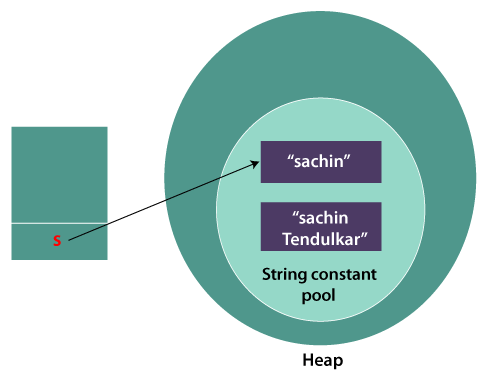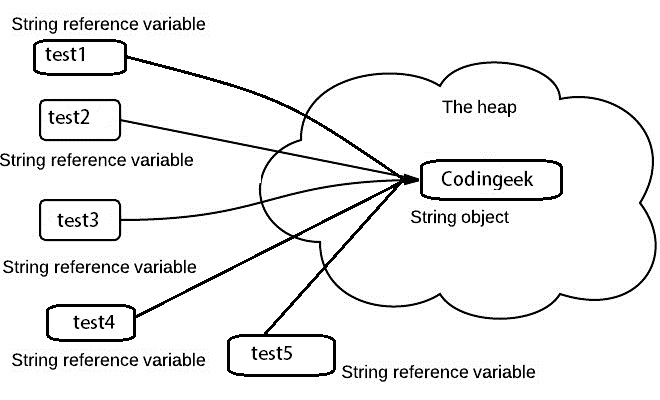Why Are Strings Immutable in Java? Essential Expertise for Designers
Why Are Strings Immutable in Java? Essential Expertise for Designers
Blog Article
What Is Immutable Strings and How It Functions
In the realm of programming, comprehending the principle of immutable strings is critical for developing safe and secure and robust applications. Unalterable strings refer to strings that can not be changed after they are produced, ensuring information integrity and predictability within the code. This basic principle plays a crucial role in numerous shows languages and supplies an unique technique to managing data. By exploring the ins and outs of how immutable strings work, one can reveal a world of benefits and possibilities that can raise the quality and efficiency of software program development.
The Basics of Immutable Strings
Immutable strings, as a basic idea in programs, are personality series that can not be altered as soon as they are created. This suggests that as soon as a string is appointed a worth, that worth can not be changed. In languages like Python and Java, strings are unalterable things, causing numerous effects in regards to memory administration and data honesty.
One of the crucial benefits of unalterable strings is that they give a complacency in information control. Because the material of an immutable string can not be modified, it ensures that the original data continues to be intact, lowering the risk of unexpected changes during program execution (Why are strings immutable in Java?). This home likewise streamlines debugging processes, as designers can trust that when a string is defined, its worth will certainly not be inadvertently altered
When a brand-new string is created based on an existing one, rather than customizing the initial string, the brand-new value is kept separately. Overall, understanding the basics of immutable strings is important for grasping shows concepts and maximizing code efficiency.
Benefits of Immutable Strings
Structure upon the security and effectiveness advantages of unalterable strings, their advantages reach boosting code reliability and simplifying simultaneous programming tasks. By being unalterable, strings can not be customized after production, which removes the risk of unintended changes in the data they keep. This inherent immutability guarantees that when a string is developed, its value stays continuous throughout the program's implementation, reducing the chances of bugs caused by unforeseen modifications.
Furthermore, immutable strings contribute to code dependability by making it much easier to reason concerning the state of a program. Given that strings can not be altered, programmers can rely on that a string will certainly always hold the same value, simplifying debugging and upkeep efforts. This predictability results in more steady and dependable codebases.

Application in Programming Languages
Within different programs languages, the incorporation of unalterable strings is a fundamental aspect that impacts how information is taken care of and controlled within code structures. The implementation of immutable strings varies throughout different programs languages, with each language offering its very own systems to sustain this concept.

In contrast, languages like C and C++ do not have integrated support for unalterable strings. Developers more information in these languages have to manually execute immutability by imposing guidelines within their code to stop straight modifications to string items.
Ideal Practices for Functioning With Immutable Strings
When dealing with immutable strings in shows languages like Java and Python, sticking to best methods makes sure secure and reliable information control. One of the vital best methods is to make use of StringBuilder or StringBuffer rather than straight manipulating strings, especially when taking care of comprehensive concatenation operations. These courses supply mutable choices for string control, aiding to prevent unnecessary memory allocations and enhancing efficiency.
Another ideal method is to use string interpolation or format functions supplied by the language instead of hand-operated concatenation. This not just improves readability however likewise aids in preventing common challenges such as unintended string alterations. Additionally, when dealing with sensitive information such as passwords or API tricks, it is critical to prevent keeping them as ordinary message in immutable strings. Making use of safe and secure storage space systems like char arrays or specialized collections for managing sensitive info assists mitigate safety threats related to unalterable strings.
Real-world Applications and Examples
Exploring functional executions of immutable strings in different sectors exposes their significant effect on information stability and system reliability. In the health care sector, unalterable strings play a critical duty in ensuring the protection and discretion of person data. By preventing unauthorized adjustments to sensitive information such as medical records and prescriptions, immutable strings help preserve conformity with rigorous privacy policies like HIPAA.
Banks also gain from the unalterable nature of strings to boost the safety and security of consumer information and deal records. Immutable strings assist protect against scams and unapproved alterations to economic information, providing a durable defense against cyber threats and ensuring the depend on and confidence of customers.

Final Thought
To conclude, immutable strings are dealt with and unchangeable sequences of characters that use advantages such as string safety and boosted performance in programming. They are implemented in different programming languages to ensure data stability and protection. Finest methods for dealing with unalterable strings consist of preventing straight modifications and making use of approaches that return new string things. Real-world applications of unalterable strings consist of information file encryption, caching, and string control tasks.
Unalterable strings refer to strings that can not be changed after they are created, making sure information honesty and predictability within the code. When a new string is produced based on an existing one, rather than why not find out more customizing the original string, the brand-new worth is saved separately.In languages like Java and Python, strings are unalterable by default, meaning that once a string item is produced, its value can not be transformed - Why are strings immutable in Java?. Ideal techniques for functioning with unalterable strings consist of preventing straight adjustments and making use of methods that return brand-new string objects. Real-world applications of immutable strings consist of data encryption, caching, and string manipulation tasks
Report this page